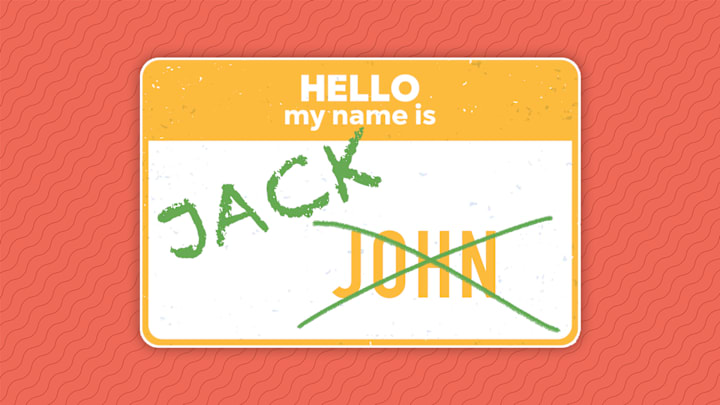A nickname generally ticks at least one of two boxes: It’s shorter than the full name (like Beth for Elizabeth), or it feels more familiar and less formal than the full name (like Charlie for Charles). And even if the nickname has been altered considerably from its origin—say, Teddy for Theodore—there’s often enough letter overlap for you to get how it happened.
None of that is true of Jack as a nickname for John. Despite sharing a first letter, they seem like completely unrelated names. What gives?
The Jacques Theory
One old theory suggests that they are completely unrelated names. Since Jack sounds a lot like Jacques, the French version of James, some scholars have assumed that it must have come from Jacques. In that case, English speakers must have shifted the nickname from James to John.
But there isn’t much evidence to support this theory. Records of medieval Jameses who went by Jack are scarce compared to Johns who went by Jack [PDF]. Moreover, it doesn’t explain how English speakers came to ascribe the nickname to the wrong name.
The Diminutives Theory
The more widely accepted theory suggests that Jack did begin as a nickname for John, and it’s simply missing some letters that make the connection more obvious. The exact etymological trail is up for debate.
E.W.B. Nicholson identified one possible path in his 1892 book The Pedigree of Jack and of Various Allied Names. The Latin name Johannes evolved into Jan, to which people added the diminutive suffix -kin for the nickname Jankin. The first “n” sound got dropped, and people abbreviated the new version, Jackin, to Jack. There’s support for this path in an early-15th-century book that, while discussing the Anglo-Saxon habit of dropping sounds in names, mentions “Jankin” and “Jacke” as variants of “Johanne.”
Another path puts more emphasis on -ke, a Middle Dutch version of -kin. According to the Oxford English Dictionary, Middle Dutch speakers added that diminutive to Jan for the nickname Janke, which—similar to Nicholson’s theory—eventually became Jack via loss of the “n” sound.
All the spelling variation makes it tough to confirm a tidy linear evolution; historical references to Jankin and Janke (not to mention many other iterations) suggest that both diminutives played some part in the journey from John to Jack. But it doesn’t seem like Jacques was involved.
Learn More About Names:
